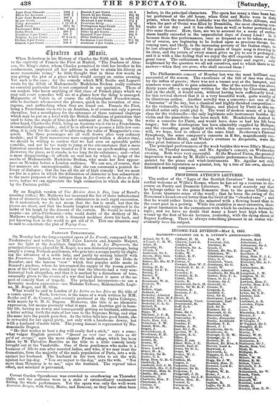The Philharmonic concert of Monday last was the most brilliant
and successful of the season. The excellence of the bill of fare was shown by the influx of guests ; there was not a vacant seat at the banquet, and numbers were unable to gain admission. One of the novelties was above thirty years ord—a symphony written for the Society by Cherubini, and laid on the shelf, it would seem, without having been sufficiently tried ; for this revival showed that it is a very beautiful work, quite worthy of its illustrious author. Another novelty was a concerto—not one of the " fantasias " of the day, but a classical and highly-finished composition— for the violoncello, written by Molique, and played by Piatti as this un- rivalled artist only could play it. The want of modern music of a high class for the violoncello—the only legitimate solo instrument besides the violin and the pianoforte—has been much felt. Mendelssohn desired to write a concerto for Piatti, and would have done so had his life been longer ; but the desideratum has been admirably supplied by Molique, and the exceeding great delight with which this concerto was received will, we hope, lead to others of the same kind. Beethoven's Pastoral Symphony, the same composer's concerto in E fiat, magnificently exe- cuted by Charles Halle, and Weber's overture to Euryanthe, were the other great features of this concert.
The principal performances of the week besides this were Ella's Musical Union, on Tuesday morning, and Mr. Aguilar's concert, on Wednesday evening. Both were very successful. At the Musical Union, the greatest impression was made by M. Halle's exquisite performance in Beethoven's quintet for the piano and wind-instruments. Mr. Aguilar not only maintained his reputation as a pianist, but, by a trio of his own, showed himself a masterly composer.


























 Previous page
Previous page